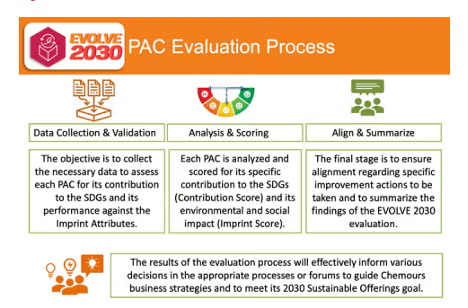Sustainability Challenge:
Companies are seeking ways to improve, enhance and evaluate their sustainability performance.
Chemistry Solution:
Chemours developed the EVOLVE 2030 methodology to evaluate its product portfolio and new product development pipeline using a data-driven, science-based approach.
Sustainability Benefit:
The EVOLVE 2030 methodology is helping Chemours meet its goal that 50 percent or more of its products make a specific contribution to the UN Sustainable Development Goals (SDGs).
Companies are looking for ways that they can evaluate their products and operations to enhance safety and sustainability in a way that is credible, measureable and able to be validated by external stakeholders.
To address this, Chemours developed its comprehensive EVOLVE 2030 methodology to evaluate the company’s portfolio of new and existing products, to identify their specific contributions to the United Nations Sustainable Development Goals (UN SDGs), as well as their net impact on society and the environment.
EVOLVE 2030 is aligned with the World Business Council’s Portfolio Sustainability Assessment method, which uses a Product-Application Combination (PAC) assessment methodology that considers both the product itself and its use-phase application. The methodology uses a data-driven, science-based approach, relying on specific criteria to evaluate and score the lifecycle impacts of products in their applications, based on factors such as greenhouse gas (GHG) and fluorinated organic chemical (FOC) emissions intensities, landfill waste intensities, hazards, exposures, risks to human health and the environment, and climate impacts.

Each PAC is evaluated for its contribution to the UN SDG targets and indicators, and measured in accordance with its significance, or the relative role the product plays in helping to meet the SDG; and magnitude, or the relative importance of the solution for achieving the SDG.
The PAC evaluation process consists of three stages: Data Collection & Validation, Analysis & Scoring, and Align & Summarize:
The relevant business and functional experts are involved in the process, providing transparency and understanding of underlying factors affecting sustainability. Chemours is working to meet the goal that 50 percent or more of its revenue comes from offerings that make a specific contribution to the UN SDGs.
With a focus on validation, reproducibility and transparency, Chemours obtained third-party assurance on the EVOLVE 2030 methodology from Lloyds Register Quality Assurance (LRQA) in fall 2019. Chemours has shared the EVOLVE 2030 methodology publicly and engaged in dialogue with interested stakeholders to enable its continual improvement and has received interest from national governments, inter-governmental organizations, customers and value chain stakeholders on how the methodology may be adapted by others and mainstreamed.